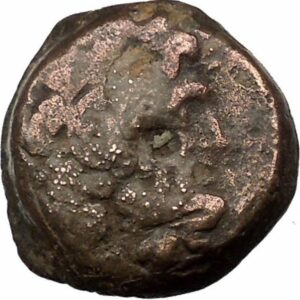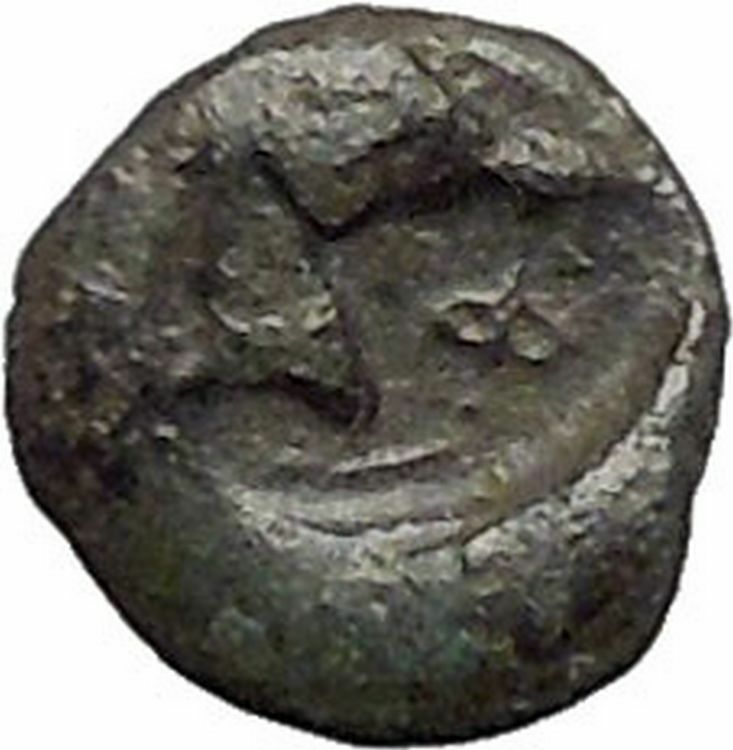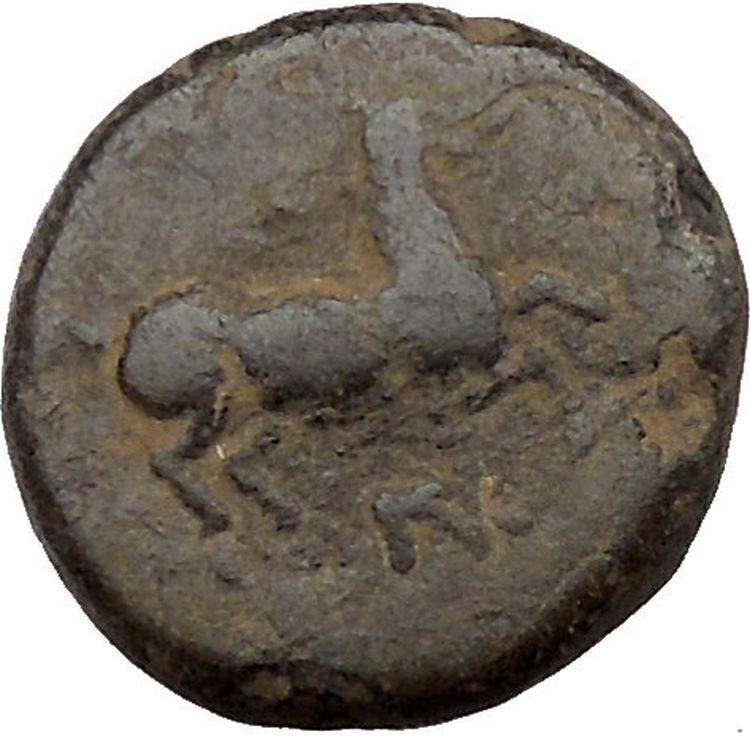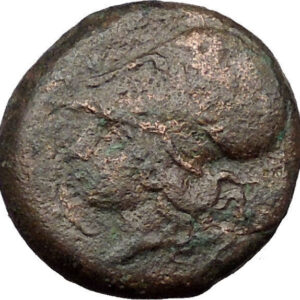|
Greek city of Larissa in Thessaly
under Thesssalian League
Bronze 20mm (7.14 grams) Struck 196-27 B.C.
Hippolochos, magistrate.
Reference: Rogers 21; SNG Copenhagen 315
Laureate head of Apollo right.
ΘEΣΣA/ΛΩN, Athena Itonia striding right, hurling spear held in her right hand, shield on her left arm; above spear; IΠΠ-OΛO; A to left; to right, P above I.
Following the great victory of the Roman general Flamininus over Philip V of Macedon, in 197 B.C., the freedom of the Greeks was proclaimed at Corinth and a number of new autonomous coinages were initiated. Those in the name of the Thessali were struck probably at Larissa. The Thessalian League was a loose confederacy of feudal-like city-states and tribes in the Thessalian valley in Northern Greece and was run by a few aristocratic Thessalian families (Aleuadae and Skopadae). The seat of the Thessalian diet was Larissa .
You are bidding on the exact item pictured, provided with a Certificate of Authenticity and Lifetime Guarantee of Authenticity.
 In Greek and Roman mythology , Apollo , is one of the most important and diverse of the Olympian deities . The ideal of the kouros (a beardless youth), Apollo has been variously recognized as a god of light and the sun; truth and prophecy; archery ; medicine and healing; music, poetry, and the arts; and more. Apollo is the son of Zeus and Leto, and has a twin sister, the chaste huntress Artemis . Apollo is known in Greek-influenced Etruscan mythology as Apulu. Apollo was worshiped in both ancient Greek and Roman religion , as well as in the modern Greco –Roman Neopaganism . In Greek and Roman mythology , Apollo , is one of the most important and diverse of the Olympian deities . The ideal of the kouros (a beardless youth), Apollo has been variously recognized as a god of light and the sun; truth and prophecy; archery ; medicine and healing; music, poetry, and the arts; and more. Apollo is the son of Zeus and Leto, and has a twin sister, the chaste huntress Artemis . Apollo is known in Greek-influenced Etruscan mythology as Apulu. Apollo was worshiped in both ancient Greek and Roman religion , as well as in the modern Greco –Roman Neopaganism .
As the patron of Delphi (Pythian Apollo), Apollo was an oracular god — the prophetic deity of the Delphic Oracle . Medicine and healing were associated with Apollo, whether through the god himself or mediated through his son Asclepius , yet Apollo was also seen as a god who could bring ill-health and deadly plague as well as one who had the ability to cure. Amongst the god’s custodial charges, Apollo became associated with dominion over colonists , and as the patron defender of herds and flocks. As the leader of the Muses (Apollon Musagetes) and director of their choir, Apollo functioned as the patron god of music and poetry . Hermes created the lyre for him, and the instrument became a common attribute of Apollo. Hymns sung to Apollo were called paeans .
In Hellenistic times, especially during the third century BCE, as Apollo Helios he became identified among Greeks with Helios , god of the sun , and his sister Artemis similarly equated with Selene , goddess of the moon . In Latin texts, on the other hand, Joseph Fontenrose declared himself unable to find any conflation of Apollo with Sol among the Augustan poets of the first century, not even in the conjurations of Aeneas and Latinus in Aeneid XII (161–215). Apollo and Helios/Sol remained separate beings in literary and mythological texts until the third century CE.
Athena or Athene (Latin: Minerva ), also referred to as Pallas Athena, is the goddess of war, civilization, wisdom, strength, strategy, crafts, justice and skill in Greek mythology . Minerva , Athena’s Roman 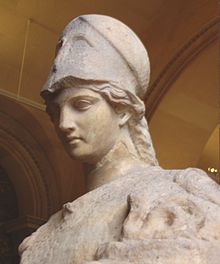 incarnation, embodies similar attributes. Athena is also a shrewd companion of heroes and the goddess of heroic endeavour. She is the virgin patron of Athens . The Athenians built the Parthenon on the Acropolis of her namesake city, Athens, in her honour (Athena Parthenos). Athena’s cult as the patron of Athens seems to have existed from the earliest times and was so persistent that archaic myths about her were recast to adapt to cultural changes. In her role as a protector of the city (polis), many people throughout the Greek world worshiped Athena as Athena Polias (“Athena of the city”). Athens and Athena bear etymologically connected names. incarnation, embodies similar attributes. Athena is also a shrewd companion of heroes and the goddess of heroic endeavour. She is the virgin patron of Athens . The Athenians built the Parthenon on the Acropolis of her namesake city, Athens, in her honour (Athena Parthenos). Athena’s cult as the patron of Athens seems to have existed from the earliest times and was so persistent that archaic myths about her were recast to adapt to cultural changes. In her role as a protector of the city (polis), many people throughout the Greek world worshiped Athena as Athena Polias (“Athena of the city”). Athens and Athena bear etymologically connected names.
Larissa, sometimes written Larisa on ancient coins and inscriptions, is near the site of the Homeric Argissa. It appears in early times, when Thessaly was mainly governed by a few aristocratic families, as an important city under the rule of the Aleuadae , whose authority extended over the whole district of Pelasgiotis . This powerful family possessed for many generations before 369 BC the privilege of furnishing the tagus, the local term for the strategos of the combined Thessalian forces. The principal rivals of the Aleuadae were the Scopadac of Crannon , the remains of which (called by the Turks Old Larissa) are about 14 miles south west. The inhabitants sided with Athens during the Peloponnesian War.
As the chief city of ancient Thessaly, Larissa was directly annexed by Philip II of Macedon in 344, and from then on Larissa was under Macedonian control; in 196 B.C. Larissa became an ally of Rome and was the headquarters of the Thessalian League .
Coordinates  39°38.5′N 22°25′E 39°38.5′N 22°25′E
|





 In Greek and Roman mythology , Apollo , is one of the most important and diverse of the Olympian deities . The ideal of the kouros (a beardless youth), Apollo has been variously recognized as a god of light and the sun; truth and prophecy; archery ; medicine and healing; music, poetry, and the arts; and more. Apollo is the son of Zeus and Leto, and has a twin sister, the chaste huntress Artemis . Apollo is known in Greek-influenced Etruscan mythology as Apulu. Apollo was worshiped in both ancient Greek and Roman religion , as well as in the modern Greco –Roman Neopaganism .
In Greek and Roman mythology , Apollo , is one of the most important and diverse of the Olympian deities . The ideal of the kouros (a beardless youth), Apollo has been variously recognized as a god of light and the sun; truth and prophecy; archery ; medicine and healing; music, poetry, and the arts; and more. Apollo is the son of Zeus and Leto, and has a twin sister, the chaste huntress Artemis . Apollo is known in Greek-influenced Etruscan mythology as Apulu. Apollo was worshiped in both ancient Greek and Roman religion , as well as in the modern Greco –Roman Neopaganism .


